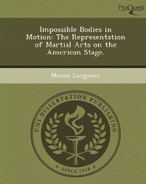Dissertation Abstract:
Impossible Bodies in Motion:
The Representation of Martial Arts on the American Stage
Advisor: Downing Cless
Committee: Barbara Grossman, Laurence Senelick, Kevin Wetmore
Submitted in partial fulfillment for the requirements for the degree of Doctor of Philosophy in Drama at Tufts University
UMI #3475077

ABSTRACT: This dissertation explores and interprets the representation of martial arts on the American stage as a specific manifestation of stylized stage violence. These appearances of simulated physical conflict relate to the larger embodied practices of both stage combat and martial arts, as well as how this phenomenon reflects societal understanding of the potentialities of the human body in motion.
Chapter One is an analysis of the semiotics of simulated violence. Chapter Two is a series of case studies of mainstream plays and musicals that involve martial arts, and concerns both dramaturgical and production issues of staging simulations of advanced physical agency. Chapter Three concerns contemporary adaptations of Macbeth set in feudal Japan and the production and dramaturgical concerns of having samurai characters on the stage. Chapter Four discusses the Vampire Cowboys Theater Company, an award winning troupe based in New York City that is famous in part for their martial arts based action sequences.
The term “Impossible Body” is used throughout this study to describe those movements that represent events that are in violation of Newtonian mechanics. The Impossible Body is often one with exaggerated agency and physical prowess, and is a phenomenon that often appears in various forms of entertainment when a character is written as a martial artist.
These elements are placed in context by contemporary writings on violence and self-defense, existing scholarship on stage combat, martial arts history, humor, and critical theory.
This dissertation is available via the Tufts University Digital Library
Chapter One is an analysis of the semiotics of simulated violence. Chapter Two is a series of case studies of mainstream plays and musicals that involve martial arts, and concerns both dramaturgical and production issues of staging simulations of advanced physical agency. Chapter Three concerns contemporary adaptations of Macbeth set in feudal Japan and the production and dramaturgical concerns of having samurai characters on the stage. Chapter Four discusses the Vampire Cowboys Theater Company, an award winning troupe based in New York City that is famous in part for their martial arts based action sequences.
The term “Impossible Body” is used throughout this study to describe those movements that represent events that are in violation of Newtonian mechanics. The Impossible Body is often one with exaggerated agency and physical prowess, and is a phenomenon that often appears in various forms of entertainment when a character is written as a martial artist.
These elements are placed in context by contemporary writings on violence and self-defense, existing scholarship on stage combat, martial arts history, humor, and critical theory.
This dissertation is available via the Tufts University Digital Library